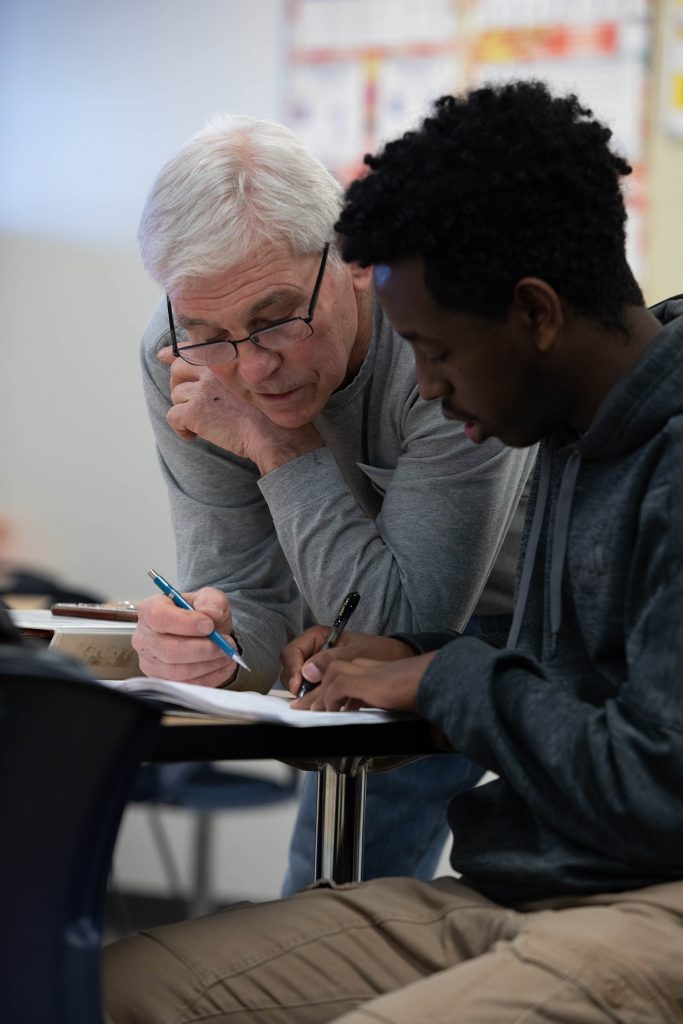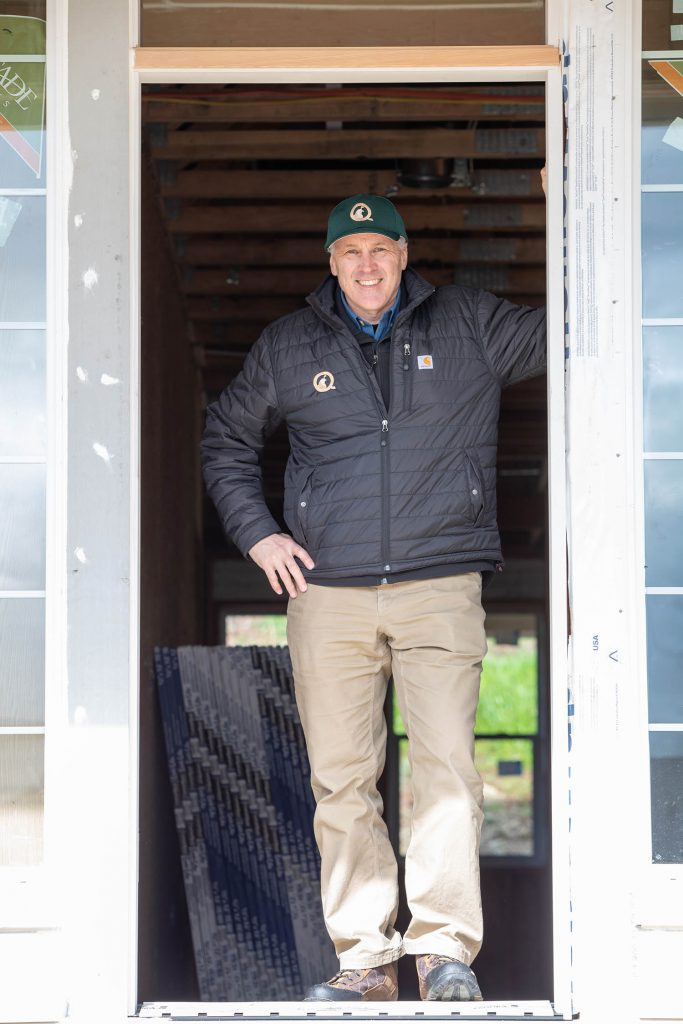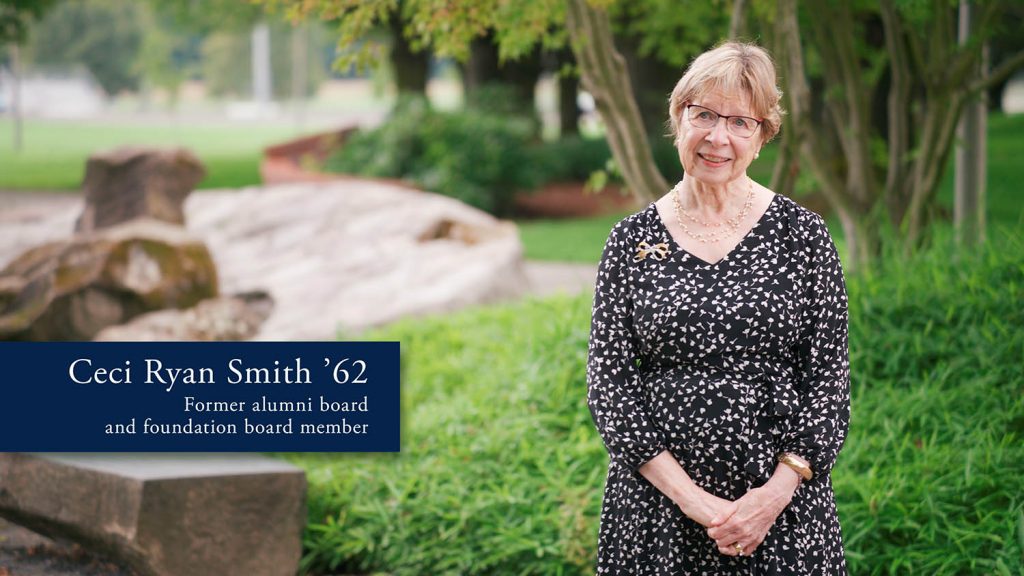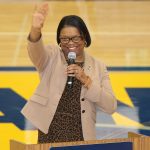Getting back more than they give
Long-time volunteers exude the benefits of their commitment to Clark, the community
John Allen, a native New Yorker, flew to Seattle for a job interview in 1972, hoping to land a West Coast job with his employer, General Electric (GE). The interview went poorly and Allen left feeling defeated.
To his surprise, he got a call offering him a job in Portland.
Someone from the company had learned that instead of taking a cab from the airport to the interview, Allen had walked.
“It was like six miles,” he said. “I don’t think it ever occurred to me to take a cab.”

Volunteer John Allen helps a Clark student in the transitional studies program with a math problem. Photo by Jenny Shadley
The same do-it-yourself mindset that landed Allen that job helped carry him through a successful career including co-founding and running a business that manufactured steam turbines. First as a worker and then as a boss, Allen said he always believed that the most important trait was simply a willingness to work hard.
“Anybody who was sincere and trustworthy and dependable, you could find a place for them at work,” he said. “You don’t need a genius; you don’t need someone who’s done it all. You just need someone who shows up and does the work.”
Allen, who has lived in Battle Ground since 1972, retired in 2001 but keeps showing up and doing the work. Twice a week he spends his morning helping Clark College’s transitional studies department, which assists students in honing their skills and preparing for college-level courses. Allen said he recognizes and admires that same can-do attitude in many of the students.
Volunteering is one way for community members to give to Clark College. Just as a financial donation can fund a scholarship that enables someone to attend college and start a new life, volunteering is another way to help Clark College support the transformative goals of students. Volunteers sit on advisory boards, mentor students and help in the classroom.
Endless rewards
About 15 years ago, Allen read a newspaper article that Clark College could use more volunteer tutors. Newly retired, he went in for an interview. Allen was quickly assigned to help two Russian sisters with their English.
Allen met regularly with the women for years. He and his wife, Kathleen, became friends with the women and their families. The sisters’ English fluency improved and they attained their U.S. citizenship. They still keep in touch with Allen but he no longer tutors them.
“I really couldn’t take them much farther,” he said. “Once we got beyond the present, past, future tenses and into… progressive and imperfect, I couldn’t help them anymore.”
The experience was rewarding for Allen, so he went back to Clark and asked for other ways he could help. That’s when he was invited to help tutor students in the classroom. He’s been coming back week after week ever since—15 years and counting.
Transitional studies attracts students with a host of abilities. Some are still learning English as a second language, while others never completed high school and are working toward a GED. A typical class begins with a short math lesson followed by time to practice. Allen and the instructor walk around the room, offering individual help to students.
One benefit of volunteering is that Allen, 75, has sharpened his own math skills.
“I can do operations in my head a lot better,” he said.
Allen, who also volunteers weekly for Catholic Community Services, said he reaps other benefits, too. He has become good friends with some of the transitional studies instructors. He finds himself inspired by the individuals, who tend to be non-traditional college students.
“I have a special appreciation for the Hispanic women,” he said. “Some of them struggle with English. They have a job on the side. They have a couple of kids at home. And (still) they come in four days a week and work hard to learn.”
Calling Clark alumni. When the campus returns to active operations, there’s a need for volunteers. Could you help with a college event or program? Sign up today to help us identify exciting new college resources.
Contact Ed Boston, director of alumni relations, at eboston@supportclark.org or 360.992.2767.
Community college appreciation
Like many Clark volunteers, Allen and his wife, Kathleen, also donate money to the college.
“We have no children,” Allen said. “And we’re comfortable. So I don’t mind giving money (to) something that’s worthwhile.”
Because he spends so much time in Clark classrooms, he sees firsthand how hard the students work and how college courses elevate their lives. Although he never attended Clark, Allen has long understood the value of community college. By the time he strolled through those Seattle neighborhoods on his way to that fateful GE interview, he’d already taken a winding career path.
Allen enlisted in the Navy when he was 17 under a program that allowed him to be discharged at 21. He earned an associate degree at Suffolk County Community College in New York before landing a job at GE.
Allen still looks back fondly at those years of his life. “I had the greatest instructors,” he said. He is reminded of them when he volunteers at Clark.
“I see that at Clark,” he said. “The instructors are really there to help get you through, and they care about their students.”
Business connections
Not all Clark volunteers are in a classroom. Jon Girod, a local real estate developer and owner of Quail Homes, first volunteered to help Clark College when his three sons were in middle and high school. Since all three boys played baseball at Fort Vancouver High School, Girod helped raise the funds to rebuild their baseball program. Clark was looking to revive its baseball program, so the college president and a coach reached out to Girod.
“I’m from Tigard and my granddad owned a grocery store there. He sponsored and coached an American Legion baseball team for 20 years,” Girod said. “They asked and I said, ‘yeah, I can help.’”
As his sons approached college age, Girod encouraged them to consider Clark.
“They had other choices but I said, ‘let’s take a look at this, your dollar will stretch farther.’” All three of Girod’s sons went to Clark—and played baseball for the college—before transferring to a four-year college to earn bachelor degrees.
With his sons enrolled at Clark, Girod came to appreciate the college for the quality of education it provided. Two of his sons went into engineering—a topic they weren’t exposed to at home. Girod said he appreciates that Clark gave the boys a chance to try different subjects and discover their true interests without racking up debt. He said Clark prepared all three of his children to transition smoothly to a four-year college.
“The more I learned about it, the more I thought that this is such an incredible resource for our community,” Girod said.

Jon Girod, owner of Quail Homes and parent of alumni, first volunteered at Clark when his three sons were in middle and high school. By Jenny Shadley
Today, Girod volunteers to bridge community connections for Clark. He wants to strengthen ties between the college and local businesses, finding inspiration in a program launched by Chris Peterson, a recently retired college football coach at Washington State University and Boise State University.
“In the summers (Peterson) had an internship for every player,” Girod said, which taught the student-athletes how to succeed in life after college, and helped get local businesses involved in the university.
“To me, that’s where I’d like to see our efforts here in the community—bring the kids into all the local businesses,” he said. “At the end of the day if you want to have quality jobs in your community, you need to have an educated workforce and education needs to be diverse, it can’t be linear.”
Alumna’s dedication
Ceci Ryan Smith ’62 grew up in Vancouver and studied liberal arts at Clark College before transferring to Oregon State University, where she earned a degree in education. She earned a master’s degree at San Diego State University and met her husband, Dave. They raised a family together while Dave flew commercial flights for Delta Airlines. Ceci Smith kept in touch with some of her Clark classmates, mostly through Christmas cards. Smith also monitored the college, thanks to its longtime director of public relations, Bob Moser, who worked at the college for 32 years and served on Clark College Foundation’s Board of Directors. He died in 2012.
“All the places I lived, Bob Moser always seemed to find me,” Smith said with a laugh. “Bob Moser never let go of me.”
With her husband working for an airline based in Atlanta, Smith never expected to return to the West Coast. However, when Delta started flying to Asia, Dave Smith was assigned the new trans-Pacific routes. The family moved to Vancouver, Wash., Soon after, Moser reached out to Ceci Ryan Smith and invited her to lunch.
“He said, ‘Everyone in Clark County and Skamania County has a Clark College story… let’s start an alumni association,’” Smith recalled.
That’s exactly what Smith did. She helped start Clark’s Alumni Association, which assisted with the alumni program for decades finally ending in 2017. Today, Clark’s alumni program has an advisory body that helps the alumni director with activities and services.
Smith went on to become a “super” volunteer, serving in the alumni association, as well as Clark College Foundation’s Board of Directors. She helped launch an alumni scholarship that today provides up to three full-tuition scholarships annually. She is a 1998 Woman of Achievement recipient, and in 2001, Clark College Foundation presented her with its most prestigious award, the Presidential Award for Excellence.
The Smith children went to Clark, and Ceci Smith said she expects several of her grandchildren will attend the college as well. She has come to appreciate how much of the economy and community rely on Clark College.

Ceci Ryan Smith ’62 is a long-time volunteer at Clark. Photo by Magaurn Media
“Anytime you go to the dentist, ask where your dental hygienist went to school—probably to Clark,” she said. “Clark supplies our community with all of our dental hygienists, our nurses, our legal assistants (and) our teachers.”
The Smiths are longtime donors to Clark and although she is no longer an official volunteer, Ceci Ryan Smith is informally recruiting the next generation of community donors and volunteers.
Smith purchased two tables at a recent fundraiser for a health foundation in Vancouver, and gave one to her children, their spouses and their friends.
“They’re in their 40s,” she said. “We didn’t expect them to give a lot of money. But we said, ‘come and get comfortable.’ Because they’re learning how to do it, you’ve kind of got to bring them along.”
Smith said that volunteering is a great opportunity for community members who don’t have extra money to donate.
“Everybody has a gift and there’s some student out there who needs it,” she said. “If you just…mentor them in math or sit down with them and tell them what it’s like to work in your field, that’s valuable.”
More than 75% of the pre-college and college-level students at Clark are the first in their families to go to college. These individuals do not have resources or experiences to turn to when applying, enrolling or navigating college. Having a deep pool of volunteers to call on for a variety of tasks is essential. Clark College Foundation is one of those resources that connects students with alumni mentors, students to donors and a myriad of other personal connections.
Story by Lily Raff McCaulou, a journalist whose writing has appeared in The New York Times, The Atlantic, The Guardian and Rolling Stone. She lives in Bend, Ore. Visit her online at www.lilyrm.com.



